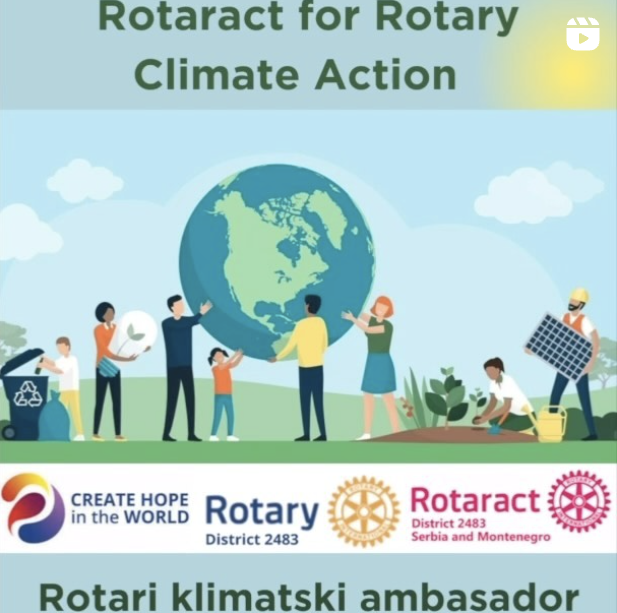by Marija Jevtic, MD, PhD, Rotary District 2483 Climate Ambassador
If our planet Earth were to be viewed as an organism, it could be said to have become “highly febrile.” Human activities focused on industrial and economic development in the pursuit of material gain, combined with completely absent or insufficient concern about their influence on the environment, have led to a reaction by the planet.
Serbian Rotarians and Rotaractors are implementing urgent, wide-reaching work to raise awareness of this crisis within Rotary and beyond, mobilizing the trust and leadership we’ve earned through our professions, our Rotary District and Zone, our roles in civil society, and the European Union. This article sketches our action starting in Rotary International’s Imagine year (2022-23) and projects it into the future.
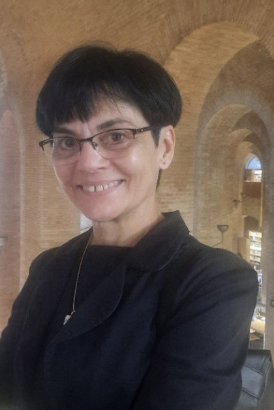
Photo of Dr. Marija Jevtic.
As a physician and professor of public health, I’ll start with a review of the symptoms our planet is manifesting because of the malady of climate change, and the impacts these are having on the health and mental health of humans. Then, I’ll report on the actions we are taking as members of the Rotary family, and how we’re connecting with a wider audience.
Signs, symptoms, and impacts of the climate change malady
Earth, its delicate balance having been endangered, reacts with a spectrum of symptoms, presenting clinical features of an illness which is becoming chronic in character. This malady is manifested through heatwaves, floods, hurricanes, tsunamis, as well as other strong winds, heavy rains, and more pronounced changes in temperatures and unstable weather in hardest-hit areas. In addition to these physical manifestations, there are changes in biodiversity. The number of endangered species on our planet is rising.
Cities are the greatest causes of climate change, and the human population in cities is the most subjected to the health-damaging consequences. The development of infrastructure, provision of necessary energy sources, and economic possibilities including the availability of jobs make urban settings attractive living environments for individuals and large populations.
It is predicted that 70% of the human population will live in urban settings by the year 2050. But this growth is accompanied by significant risks to human health. Cleaner energy systems, promoting the safe use of public transportation, and an infrastructure that promotes active movement like cycling or walking could reduce carbon emissions, and reduce the burden of household air pollution.
Rising temperatures and variable precipitation are likely to decrease the production of staple foods in many of the poorest regions. This increases the prevalence of malnutrition and undernutrition, which currently cause more than 3 million deaths every year. Based on some assessments, catastrophes due to climate change are inescapable; however, their arrival is gradual. This is primarily relevant to changes that affect agriculture and food production.
According to the WHO, climatic conditions strongly influence water-borne diseases and diseases transmitted through insects, snails or other cold-blooded animals. Changes in climate are likely to lengthen the transmission seasons of significant vector-borne diseases and alter their geographic range. Malaria is also strongly influenced by climate, and kills more than 600,000 people every year – mainly African children under the age of 5. Lack of safe water can compromise hygiene and increase the risk of diarrheal disease, which kills approximately 760,000 children under 5 years of age every year.
In extreme cases, water scarcity and drought lead to famine. By the late 21st century, climate change is likely to increase the frequency and intensity of drought at both regional and global levels. Research on the influence of climate change on mental health suggests their connection with the development of post-traumatic stress. Serious anxiety disorders are correlated to acute disasters such as earthquakes, floods, fires, and hurricanes. Traumatic exposure can cause reactions ranging from general somatic and mental disorders (with difficult paths to recovery) to serious psychopathology, increased aggression, and suicide.
Climate change is associated with increasingly longer and harder periods of extreme heat and/or drought. These situations can permanently drive people from their homes, making them displaced persons at a higher risk of developing depression and trauma due to irreversible losses. It is assessed that by 2050 there could be 150 million displaced persons due to floods, erosion, and agricultural degradation.
WHO warns that climate change is expected to cause approximately 250,000 additional deaths per year between 2030 and 2050, 38,000 deaths of elderly people due to their suffering resulting from heat exposure, 48,000 annual deaths from diarrhea and 60,000 from malaria, and 95,000 due to childhood undernutrition. The poor, children, elderly, people with disabilities or those with pre-existing medical conditions are most at risk.
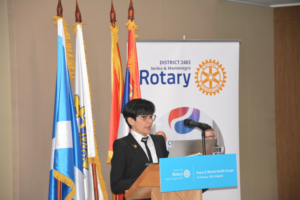
Dr. Marija Jevtic presenting at the Belgrade Peace and Mental Health Forum.
“The climate change factory” in its full capacity produces direct and indirect “by-products of climate change” which affect individual health, the health of the population as a whole, and the environment. Human activities have significantly contributed to climate change. Its consequences are a reflection of the health of Planet Earth itself and they intensify the need to increase resiliency and adaptation capability. We are in need of creative solutions that go above and beyond the action required to mitigate climate change.
Climate action in Rotary District 2483 (Serbia and Montenegro):
Our District started its climate action in Rotary’s Imagine year (2022-23) by inviting clubs, members, and friends of Rotary to sign declarations on the importance of climate actions. We attracted members and friends of Rotary and Rotaract clubs with a series of webinars dedicated to climate change and health issues.
Our webinar on Climate Change and Mental Health marked the beginning of Rotary’s climate action activities in this HOPE Rotary year (2023-24). We discussed the importance of climate change and its impact on mental health, as well as how we as a Rotary community can contribute to solutions.
Our December, 2023 webinar on Rotary at the Climate Conference COP28 as confirmation and inspiration for district climate action, was also registered on the European Commission website dedicated to events within the Climate Pact, and by doing so we contributed to greater visibility of our D 2483 activities.
At that time we launched the initiative to establish the D 2483 Rotaract Task Group On Climate Action for D 2483 with the support of District Governor Aleksandar Radojičić. Active and interested Rotaract members organized the first joint meeting of the Rotaract Climate Action Task Group in our District in January, 2024 with my leading role as the District’s Rotary Climate Ambassador.
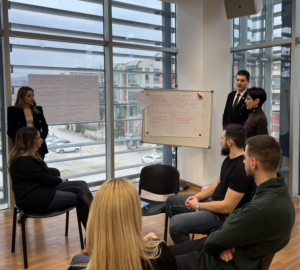
Photo of the Rotaract Conference.
Zone 21 recognized our District for its work in introducing the topic of climate and health to the Rotary community. Our representatives presented the District 2483 climate action work and our commitment to mental health at the Rotary Peace and Mental Health Forum in Belgrade on February 12th. Within the session dedicated to Mental Health at the all-day Peace and Mental Health Forum organized by the Public Image Team of Zone 21, and thanks to the leadership of PDG Ljiljana Lainović from D2483, special time was devoted to the topic of Climate Change and Mental Health. As RI President Gordon McInally pointed out, mental health and climate change, along with calling for peace, are the most important priorities today.
As a Rotarian, physician, and professor of public health, I spoke about the importance of climate change on mental health, and pointed out that the Rotary community can and should make a significant contribution to raising community understanding of this important topic. The session highlighted how our District 2483 uses the framework of Rotary Climate Action to connect climate change and mental health as serious challenges facing all communities.
On Feb. 24, 2024, the Rotary Climate Ambassador and Rotaract Climate Action Task Group for Rotary Climate Action held a training session at the University of Novi Sad. Members of 10 Rotaract clubs and more than 20 Rotaract members participated. District 2483 Governor Aleksandar Radojičić supported the training and emphasized the importance of climate action in our district. The training was publicized on the website of the European Commission. Click here for a glimpse of young scholars at work, set to an irresistible tango. In my role as District Rotary Climate Ambassador, I partnered with Ana Marija Tomić of the Rotaract Club of Belgrade Global to organize and lead this session.
Experienced Rotarians presented examples and ideas for further climate actions to Rotaract members. Nenad Tutunović (Rotary Club Čačak) emphasized the importance of greening and activities in schools and working with children. Marina Cvijanović (Rotary Club Zemun) presented entrepreneurial activities (Eco Bio Invest) of importance for climate action within the Rotary community and beyond. PDG Nikola Božić (E-club Serbia) spoke about the importance of activities within the Green Agenda in the Rotary community. Miroslav Vesković (Novi Sad Rotary Club) emphasized the importance of innovation and nature-based solution principles in climate action. Gorjana Ponjević Ballani (Rotary Club Zrenjanin) pointed out the importance of working with Interact and Rotaract clubs through examples of greening activities in Zrenjanin.
Through the training we defined short-term and long-term goals, next steps, and methods for collecting data on activities in climate action. The presentation of the group work demonstrated the great interest of the Rotaract members, as well as their dedication to and awareness of the importance of climate action. We agreed to hold a follow-up meeting in March. You can follow our activities on the D2483 Rotary Climate Action Instagram page.
ESRAG provides opportunities to share the importance of climate action. ESRAG’s monthly meeting on 22th March and environmental conference in Budapest (D1911) were opportunities for the Rotary community to exchange experiences on the actions they are undertaking to build a healthier environment for our children and grandchildren. Excellent presentations about projects operating in Hungary and young people’s suggestions to adults were presented and supported by Governors Suncica Bulat Würsching (Croatia D1913), and Andrej Bozic (Slovenia D1912), Herbert Pfeiffer of D1910, and host Governor Erzsébet Kovácsné Gilaand (D1911). I was honored to participate as a lecturer and governor’s representative from D2483.
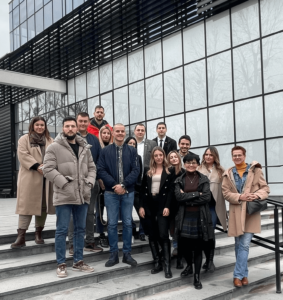
Photo of Rotaractors with Dr. Marija Jevtik.
By taking action to move us towards more awareness of climate action and how to achieve a low carbon future, we can lead by example. Our voices are able to inspire, motivate, and educate interconnected groups of people of all ages, in different parts of the global community. Our contribution in rethinking and reinventing the systems is helping communities and industry to respond properly to climate change. This is an opportunity for the Rotary community to demonstrate effective ways to better protect human health in the future.
Through our climate action it is important to motivate Rotary, Rotaract, and Interact clubs, at the District level and beyond, as well as our local community partners to reduce carbon emissions. We are doing this by creating campaigns with climate change themes including nature-based solutions, solar energy, pollution solutions, and more.
Through our climate action we encourage the Rotary family to align personal, club, business, and Rotary investments with the Four-Way Test. Leading by example, we are dedicated to a climate-friendly attitude.
With hope for a greener future and the desire for our District 2483 to be recognized as climate-responsible and active in contributing to the community, we enthusiastically continue the implementation of the agreed-upon activities, in a manner that is Holistic, Open, Persistent, and Efficient!!
Marija Jevtic, MD PhD is President of the Environment and Health Section of the European Public Health Association (EUPHA), a member of EUPHA’s Policy Group for the European Planetary Health Hub, and EU Climate Pact Ambassador. She is full professor of the Faculty of Medicine at the University of Novi Sad and the Institute of Public Health of Vojvokina in Serbia. She also serves as Scientific Collaborator at the Université Libre de Bruxelles, Research Centre on Environmental and Occupational Health, School of Public Health. Dr. Jevtic is a member of the Rotary Club of Novi Sad Eco Art in Serbia and Rotary Climate Ambassador for Rotary District 2483.

